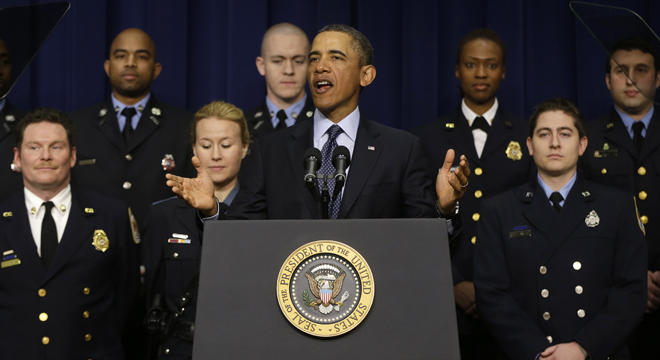President Obama has already gone to battle twice with Republicans on momentous fiscal issues since his re-election. Both times the GOP caved.
Will they do so again?
President Obama delivered a speech Tuesday morning in the White House complex detailing the “troubling” consequences of the sequester — deep, indiscriminate spending cuts to defense and domestic programs set to take effect on March 1 — and demanding that Republicans drop their blanket opposition to raising revenues in a deal to avoid it.
Flanked by a group of first responders, Obama called the cuts “arbitrary” and “brutal,” warning that they will “hurt our economy” and cost “hundreds of thousands” of jobs.
“Emergency responders, like the ones who are here today, their ability to help communities respond to and recover from disasters will be degraded,” he said. “Border principal agents will see their hours reduced. FBI agents will be furloughed. Federal prosecutors will have to close cases and let criminals go. Air traffic controllers and airport security will see cutbacks, which means more delays at airport across the country. Thousands of teachers and educators will be laid off. Tens of thousands of parents will have to scramble to find child care for their kids. Hundreds of thousands of Americans will lose access to primary care and preventive care like flu vaccinations and cancer screenings.”
It’s a replay of the strategy he used on the fiscal cliff and debt ceiling debates: use the bully pulpit to portray Republicans as obnoxious ideologues willing to crash the economy to achieve their political goals, and enlist the public to force them to back down. Both times Obama, emboldened by his re-election victory, trounced the GOP.
“Now Republicans in Congress face a simple choice,” Obama said. “Are they willing to compromise to protect vital investments in education and health care and national security and all the jobs that depend on them? Or would they rather put hundreds of thousands of jobs and our entire economy at risk just to protect a few special interest tax loopholes that benefit the wealthiest individuals and corporations. That’s the choice. Are you willing to see a bunch of first responders lose their jobs because you want to protect a special interest tax loophole? Are you willing to have teachers laid off or kids not have access to head start? Or deeper cuts in student loan programs?”
“The last thing our families can afford right now is pain imposed unnecessarily by partisan recklessness and ideological rigidity in Washington,” he said.
This time Republicans are more steeled for battle. They’re determined not to demoralize their base again after agreeing to raise taxes and extend the debt ceiling without spending cuts. They are demanding that every dollar of lower spending written into law goes into effect. They note the idea of the sequester came from the White House, even though Republicans in Congress demanded cuts of that size and voted overwhelmingly to enact it.
House Speaker John Boehner (R-OH) immediately responded in a statement digging in on his opposition to new revenues, saying tax loopholes should only be closed to lower rates.
“Washington Democrats’ newfound concern about the president’s sequester is appreciated, but words alone won’t avert it,” he said. “Replacing the president’s sequester will require a plan to cut spending that will put us on the path to a budget that is balanced in 10 years. To keep these first responders on the job, what other spending is the president willing to cut?”
Now, as before, Obama’s position is the more popular one. The revenues he and Senate Democrats are proposing to turn off the sequester for a year — requiring millionaires to pay at least a 30 percent tax rate and ending tax loopholes for the oil and gas industry — are well-liked by the public. The GOP position is that, while there are ways to make the cuts that are preferable to the sequester plan, they’d rather see the sequester take effect than raise even a penny in new revenue.
“I believe [the sequester is] going to take place,” Rep. Paul Ryan (R-WI) said Sunday on ABC’s “This Week,” blaming Obama and Senate Democrats.
Last year House Republicans voted twice to replace the sequester with deep cuts to domestic programs aimed at mitigating poverty. In December their legislation passed by a narrow 215-209 margin, and House Republicans have lost eight seats since then. Boehner says they don’t intend to pass another bill before the Senate acts.
Democratic leaders say the outcome of this battle will be reminiscent of the recent ones.
“Republicans’ position is untenable,” Senate Majority Leader Harry Reid (D-NV) said after Obama’s speech, “but only time will tell how many people must lose their jobs before Republicans listen to the overwhelming majority of Americans, and work with Democrats to forge a balanced approach.”
Obama said Tuesday that “most Americans agree with me,” calling sequestration a “manufactured crisis” and “self-inflicted wound.” He declared that his “door is open” and he’s “willing to work with anybody” to find better ways to achieve the same savings.
“The ideas that the Republicans have proposed asks nothing of the wealthiest Americans or biggest corporations,” he said. “So the burden is all on first responders or seniors or middle class families. They doubled down, in fact, on the harsh, harmful cuts that I’ve outlined, slashed Medicare and investments that create good, middle class jobs. And so far, at least, what they’ve expressed is a preference where they’d rather have these cuts go into effect than close a single tax loophole for the wealthiest Americans. Not one. Well, that’s not balanced.”










